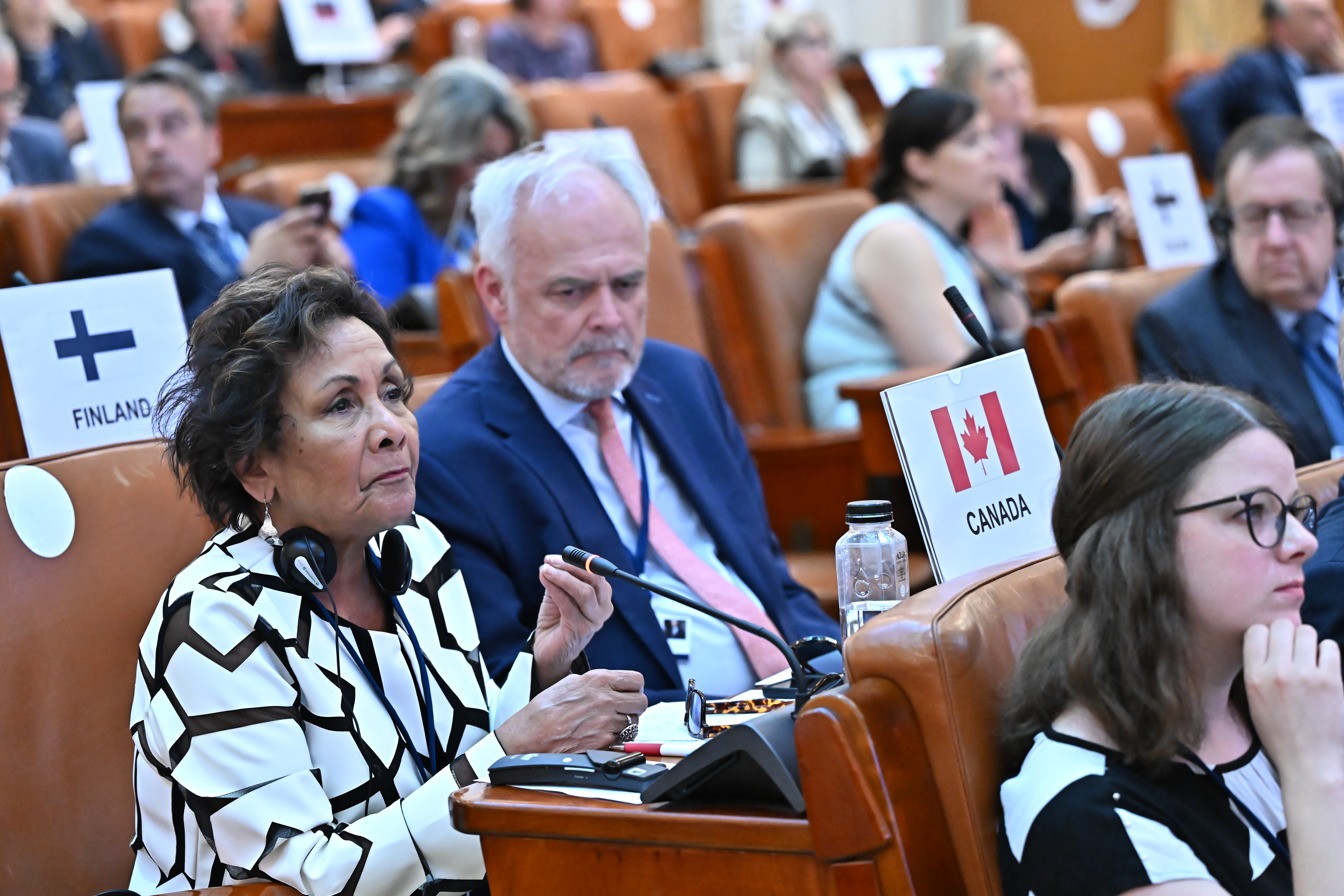My resolution on Civil Society passed unanimously to become part of the Bucharest Declaration.
RESOLUTION ON
THE ROLE OF CIVIL SOCIETY IN FOSTERING DEMOCRATIC AND INCLUSIVE SOCIETIES
- Reiterating the commitment of OSCE participating States to uphold the principles enshrined in the Helsinki Final Act, such as respect for human rights, respect for fundamental freedoms, including freedom of association, and the fulfilment in good faith of obligations under international law,
- Reaffirming OSCE commitments relevant to creating and maintaining civic space, including the Istanbul Document, in which OSCE participating States committed to enhancing the ability of non-governmental organizations to fully contribute to supporting the continued development of civil society and enhancing respect for human rights and fundamental freedoms,
- Guided by the OSCE PA Vancouver Declaration and its resolution on the role of national parliaments in enhancing the participation of civil society in decision-making processes, and the Luxemburg Declaration and its resolution on the role of civil society in realizing the aims and aspirations of the OSCE,
- Underscoring United Nations Human Rights Council resolutions 24/21, 27/31, 32/31, 38/12 and 53/13 which affirm the importance of promoting and protecting civic space,
- Recalling the United Nations 2030 Agenda for Sustainable Development and the Sustainable Development Goals, to which all OSCE participating States have committed, in particular Goal 16, which seeks to promote peaceful and inclusive societies by ensuring responsive, inclusive, participatory and representative decision-making,
- Observing with concern that democratic progress has declined or stagnated in some parts of the world, including within the OSCE region, and noting that this democratic decline affects freedom of association, including the extent to which civil society organizations can operate freely,
- Emphasizing that democratic decline and the shrinking space for civil society are interrelated,
- Affirming that civil society organizations have a right to participate in public debate regardless of whether their position is critical of positions adopted by public authorities,
- Concerned by the emergence of government-organized non-governmental organizations designed to support ruling governments while presenting themselves as independent, and convinced that such organizations undermine a diverse civil society, including by depriving independent civil society organizations of public funding,
- Emphasizing that the ability of civil society organizations to seek, obtain and use financial resources from a variety of sources is essential to the existence of a diverse civil society,
- Disturbed by the use, including by some OSCE participating States, of policies designed to deter civil society organizations from operating, and noting that these policies often contain vague provisions that provide broad discretion to public authorities and with which failure to comply carries disproportionate penalties, which can create a chilling effect on civil society,
- Expressing concern about some OSCE participating States adopting legislation and administrative measures relating to national security and counter-terrorism and subsequently misusing such legislation and measures to hinder the work of civil society,
- Witnessing with grave concern the rise of so-called anti-gender governments, which attempt to obstruct the activities of civil society organizations engaged in promoting the rights of women and lesbian, gay, bisexual, transgender and intersex (LGBTI) persons by shrinking the space necessary for these organizations to operate,
- Alarmed that, in some OSCE participating States, persons and organizations engaged in promoting the rights of women and LGBTI persons frequently face online and offline harassment, threats, attacks, surveillance and hate campaigns,
- Underscoring that human rights defenders working to advance gender equality face disproportionate rates of violence and discrimination,
- Troubled by the Russian Federation’s intensified repression of independent journalists, representatives of civil society organizations, human rights defenders, and individuals and organizations engaged in promoting the rights of women and LGBTI persons, and observing that this repression has had a disproportionately devastating effect on the lives and freedoms of LGBTI persons,
- Recalling the OSCE Moscow Mechanism Report on the serious threat to the OSCE human dimension in Belarus since 5 November 2020, which notes that at least one quarter of civil society organizations in Belarus have stopped operating since 5 November 2020, recommends that all legislation restricting the formation and operation of independent civil society organizations in Belarus be repealed, and calls on the international community to help representatives of Belarusian civil society organizations, human rights defenders, and journalists in exile to sustain their activities abroad,
The OSCE Parliamentary Assembly
- Underscores the fundamental role of civil society organizations in the promotion of human rights, including the rights of women and LGBTI persons, democracy and the rule of law, and in the provision of services to women and LGBTI persons such as sexual and reproductive health services and support to survivors of gender-based violence;
- Calls on OSCE participating States to ensure that their domestic legal environment enables civil society organizations to participate meaningfully in their society’s political, economic, social and cultural life;
- Asks all OSCE participating States that have not already done so to sign, ratify and implement the Istanbul Convention on preventing and combating violence against 84 women, which provides that all parties must recognize, encourage and support the work of civil society organizations active in combating violence against women and establish effective co-operation with these organizations;
- Urges OSCE participating States to guarantee that domestic legislation, policies and practices enable civil society organizations to engage in meaningful dialogue with public authorities regarding the development of laws and policies relating to gender issues, and ensure that such dialogue be structured, predictable and inclusive;
- Recommends that parliamentarians of OSCE participating States improve their understanding of the gendered impacts of legislation, and that parliaments establish and formalize relationships with independent civil society organizations working on gender issues and draw on their expertise when deliberating legislation;
- Condemns unjustified restrictions on the funding of civil society organizations – in particular women’s rights and human rights organizations – adopted by certain OSCE participating States, including restrictions designed to criminalize foreign funding and create burdensome administrative procedures to access permissible sources of funding;
- Calls on OSCE participating States to ensure that civil society organizations can engage in fundraising activities, whether working on gender issues or other issues, and can access diverse sources of funding, including private and foreign funding, without undue restrictions;
- Recommends that the OSCE put in place a system to monitor threats to civic space in OSCE participating States by developing a civic space index based on existing frameworks for measuring civic space;
- Invites the OSCE to assist participating States in ensuring that civic education and human rights education are included in their curricula at all levels of education, and recognizes that civic and human rights education help develop a democratic political culture, foster inclusive societies and increase civic participation;
- Encourages the OSCE Office for Democratic Institutions and Human Rights (ODIHR), as part of its election observation missions, to continue to involve civil society organizations, to monitor the ability of civil society to operate freely before and during elections and to pay particular attention to the impacts of election-related legislation on a country’s civic space;
- Welcomes the work of ODIHR to support OSCE participating States in implementing commitments relating to gender equality, including by facilitating dialogue and co-operation among civil society organizations, as well as between civil society and participating States, in promoting gender-mainstreaming
These are pages 82-84 of the Bucharest Declaration


